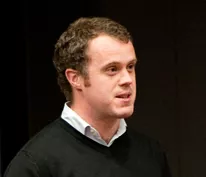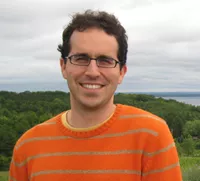
Awards recognize U of T Mississauga research strengths
“Absolutely transformative,” is how Marc Johnson describes $140,000 in funding from the government of Ontario’s Early Researcher Awards (ERA).
Johnson, an assistant professor of biology at the University of Toronto Mississauga, is one of three UTM researchers who received ERA funding. The funding allows recently appointed Ontario researchers to build their teams—and for Johnson, it means he can get his lab working quickly on cutting-edge research. “We’ll have researchers at all levels, undergraduates to graduate students and post-doctoral fellows, integrating ideas from genetics to ecology to develop a comprehensive understanding of our research questions,” he says.
The questions Johnson’s team will be working on relate to the evolutionary and ecological consequences of asexual and sexual reproduction in plants. Asexual reproduction, which results in genetically identical offspring, may provide short-term benefit to farmers who are seeking consistent reproduction of desirable traits. However, the long-term effects are unclear.
“We’re among the first teams to provide empirical insight into how creating asexual crops might actually make them more vulnerable to parasites, such as pest insects and fungi, and thus be a losing strategy in the long-term,” he says. “Decisions made about developing asexual plants will have a huge impact on food security and sustainability.”

“In a traditional survey, a researcher will randomly select respondents, and if a few conditions are met, apply those findings to the whole population,” Loewen says. However, in a self-selected survey, an individual chooses to become a respondent, with positive and negative implications. “With self-selection, you can get many more respondents, but it's much harder to generalize from these individuals to the whole population.”
Loewen’s team will be creating solutions to model this kind of data, which can then be extrapolated to better understand public attitudes. Although the research has applications for sociology, economics and consumer behaviour, Loewen says an important area will be improving our understanding of elections and democracy.

“Previous research clearly indicates that children who behave aggressively often lack moral and life skills,” Malti says. Using an innovative approach, including methods her team is developing based on its moral development research, Malti is planning an after-school curriculum to help aggressive and antisocial youth learn moral skills and provide new learning experiences. The curriculum tries to focus on areas of strength, she says, such as offering leadership opportunities. “These children and youth are often good leaders,” she points out.
Malti says aggressive problem behaviours are among the most prevalent mental disorders in childhood and adolescence. With the ERA funding, Malti and her team will be able to demonstrate that early intervention of aggressive behaviour can lead to better school outcomes, prevent delinquency and reduce long-term cost to Ontario.
U of T Mississauga researchers also shone in the recently announced Connaught New Researcher Awards, awarded by U of T to help new tenure stream faculty members establish competitive research programs.

Milstein, an assistant professor in the Department of Chemical and Physical Sciences, will focus on how the mechanics of DNA effect genetic function. “The research has the potential to advance our understanding of how cells work, with huge implications for how we approach health and disease,” he says.
Eight UTM researchers received Connaught New Researcher Awards at the $10,000 level:
- Judith Andersen (Psychology) – reducing maladaptive psychological and physiological responses among undergraduates with test anxiety
- Melissa Holmes (Psychology) – the effect of social status on gene expression in the mammalian brain
- Philip Goodman (Sociology) – prison farms and punishment in Canada
- Kevin Li (Management) – how business and litigation environment impacts reporting behaviour in firms
- Nicholas Li (Economics) – price gaps between Canada and the United States
- Lawrence Switzky (English and Drama) – rise of theatre directing as a profession in the late 19th/early 20th century
- David Taylor (English and Drama) – theatrical allusions in graphic satire from 1737-1837
- Minlei Ye (Management) – audit quality and the usefulness and timeliness of loss contingency disclosure
Patrick Gunning, assistant professor in the Department of Chemical and Physical Sciences was one of the recipients of the 2012 CSC Ichikizaki Fund for Young Chemists, presented to young chemists showing unique achievements in basic research. Gunning will be using the funds to support and promote research to develop inhibitors of the STAT5 protein for the treatment of leukemia.
According to Professor Deep Saini, U of T Vice-President and Principal of U of T Mississauga, the awards showcase the high calibre of researchers attracted to UTM. “The awards represent more than funding – they are an acknowledgement of the innovation and impact our researchers are having on their fields of study and the greater world,” says Saini.
